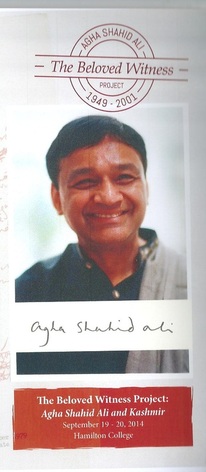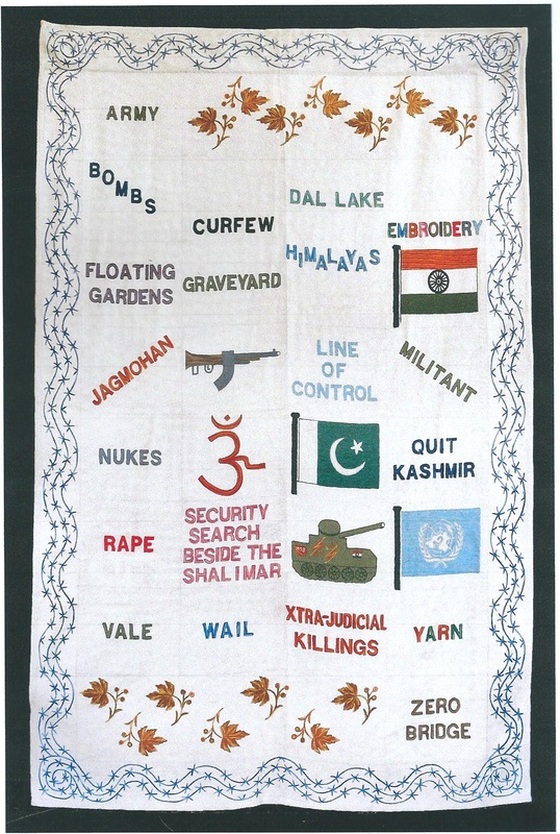
Shahid taught at Hamilton College from 1987-1993. During that time he published his second American volume A Nostalgist’s Map of America and wrote many of the poems that resulted in his most important volume The Country without a Post Office. The Country without a Post Office was written as a response to the crackdown by the Indian army on the people of Kashmir in retaliation for their support for independence from the state of India. The crackdown was very severe, including the arrest, torture and disappearance of Kashmiri men and women and the suppression of civil rights of the people generally. Curfews that brought the economy to a halt, the evacuation of Hindu Kashmiris, the destruction of mosques and temples, and the banning of assembly were employed in the name of suppressing militants whom the authorities believed were receiving support and training from Pakistan. The details of the people’s suffering during this period are represented in Basharat Peer’s memoir Curfewed Nights and in Mirza Waheed’s novel The Collaborator.
The Beloved Witness Symposium brought artists and scholars together to present and discuss Kashmir. Musa Syeed, an American of Kashmiri descent, showed his first feature film, The Valley of Saints. The film is not yet in general release but it has been making the film festival rounds and garnering prizes, including a Sundance Audience Award and an Independent Film Spirit award for cinematography. Students of film at Hamilton were riveted by Mr. Syeed’s account of living with the boatman who is the focus of the film and of the problems of shooting on location during the military enforced curfews in Srinagar. Professor Hena Ahmad, Shahid’s sister, the novelist Kamila Shamsie, Shahid’s student, and the poet Peter Balakian, Shahid’s colleague at Colgate University, told stories about Shahid, his love of cooking, his open-hearted and confident approach to life and work, and the demands he placed on himself and his students to pay attention to every word they wrote. Professor Haley Duschinski, an anthropologist who has done field work in Kashmir for many years showed slides of the people she has interviewed and talked about their efforts to create archives of the lives of loved ones killed during the military crackdown.
Although we were remembering Shahid, many of the participants were also worried about the fate of friends and family in Srinagar today. A week before the symposium, a flood broke through the levees in Srinagar putting 80% of the city under water in a matter of hours. Shahid’s family home was completely destroyed and Shahid’s brother Agha Iqbal Ali, who was supposed to attend the symposium, was in Delhi arranging for the safety of his 90-year-old father. Although all of the guests at the symposium live in the United States or England, there was still a palpable sense of loss in their discussions of Srinagar, which is now in ruins, and much uncertainty about its reconstruction.
It was fitting, then, that the day ended by recognizing that Shahid’s importance is best understood through his impact on artists who continue the work of showing us the world we live in, a world of deeper knowledge and more compassion than the news media can address. Mirza Waheed read from his new novel The Book of Gold Leaves. Kamila Shamsie read from her latest work A God in Every Stone. Peter Balakian read his elegy for Shahid and many of the members of the audience who had been students or colleagues of Shahid contributed their reminiscences of what Shamsie called “the Shahid that we have internalized.”
The title of the symposium comes from two lines from Shahid's ghazal "In Arabic":
They ask me to tell them what Shahid means: Listen, listen:
It means "The Beloved" in Persian, "witness" in Arabic.
Agha Shahid Ali, Call Me Ishmael Tonight: A Book of Ghazals, W.W. Norton, 2004
^^^^^^^^^^^^^^^^^^^
Patricia O'Neill is a professor of English at Hamilton College. She was Shahid's friend and colleague, dedicatee of Shahid's poems "Farewell" and "The Veiled Suite", and co-director with Hena Ahmad of The Beloved Witness Project: Agha Shahid Ali.

 RSS Feed
RSS Feed